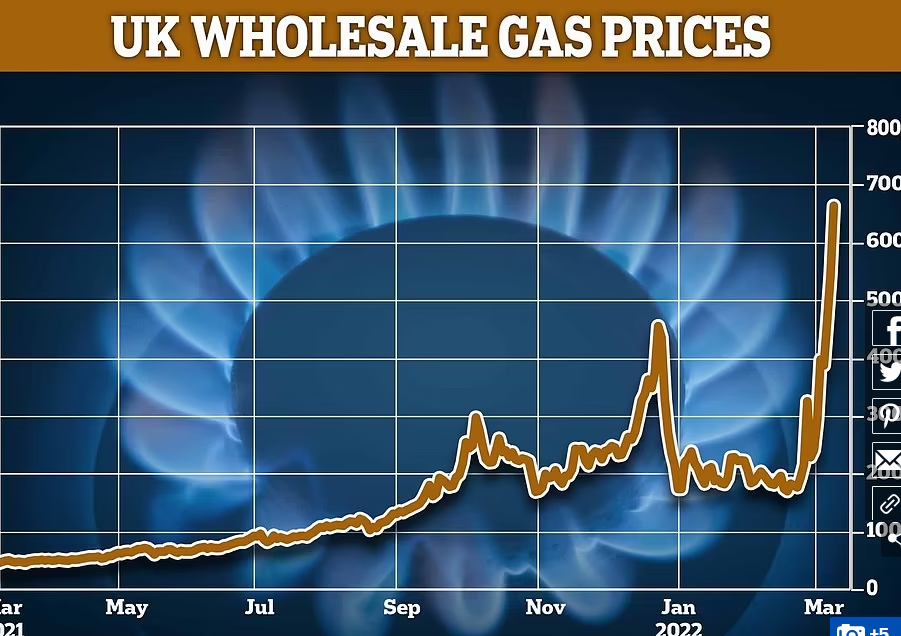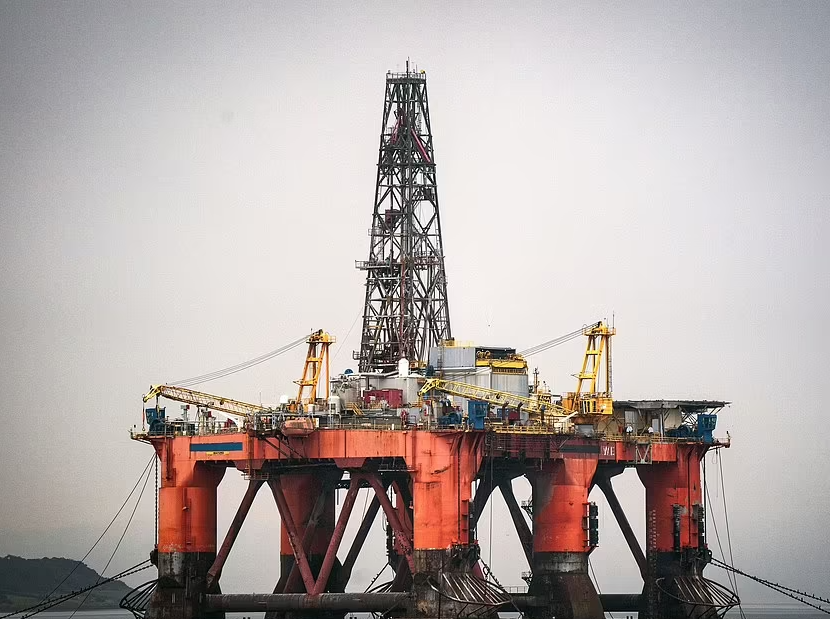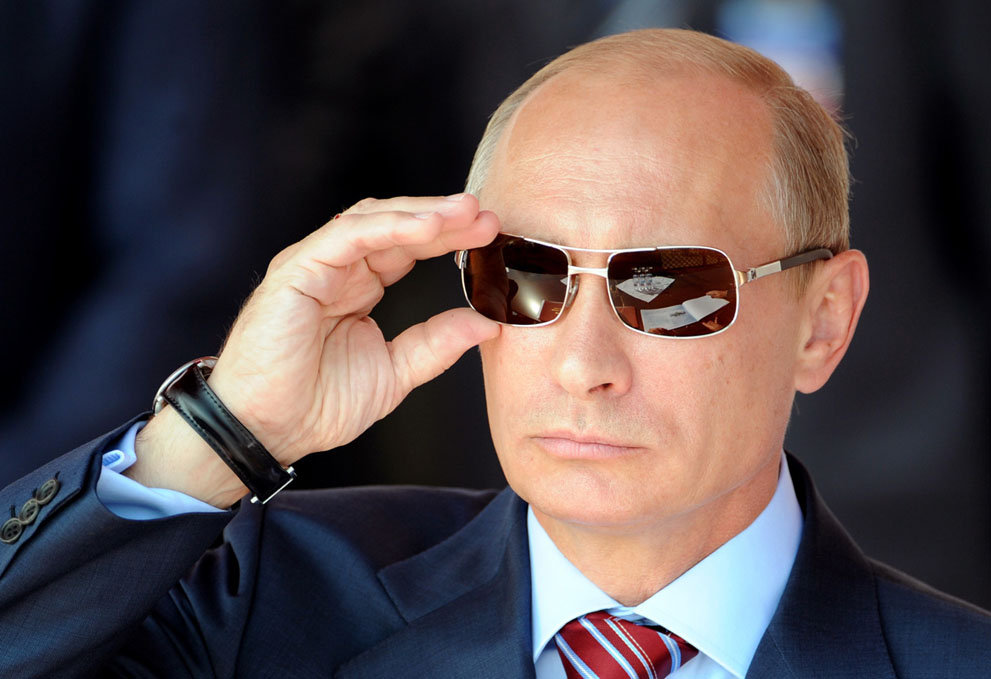Vladimir Putin on Tuesday, March 8, 2022, threatened to close his gas pipeline pumping in almost half of Europe’s gas if there is a boycott of Russian fossil fuels amid warnings this could push up oil prices over $300 per barrel, giving him even more cash to spend on his brutal Ukraine campaign.
The war in Ukraine has sent markets into a panic because the West is so reliant on Russia for its energy, which brings in at least £100 billion-a-year for the Kremlin that can be used to finance its invasion and occupation.
There are growing calls for Britain to ramp up production in the North Sea while Germany is also being urged to open up its historic gas fields. Experts also believe that nations should ramp up nuclear output and consider relying more on coal-fired power stations in the short term, despite Europe’s net zero pledges.
Oil prices have spiked to their highest levels since 2008 on Monday after U.S. Secretary of State Antony Blinken said Washington and European allies were considering banning Russian oil imports.
Today President Joe Biden will announce the boycott following relentless pressure from Republican and Democratic lawmakers in a move that could send gas prices even higher.
European allies, who rely far more on the Kremlin’s energy exports, are reportedly not joining the ban but were consulted by US officials, Bloomberg reported.
This week the wholesale cost of gas surged by 70 per cent – to a record of 800p per therm – meaning that average energy bills could easily hit £4,000 or more this year.
The soaring price of oil could render Western sanctions on Russia ineffective as the booming cost of crude allows the country to rake in billions.
Every $10 increase in oil prices provides an extra £15.2 billion ($20 billion) for the Kremlin’s coffers each year, according to an analysis from Elina Ribakova, deputy chief economist at the Institute of International Finance.

Despite imports of Russian oil having collapsed following its invasion of Ukraine, Ribakova estimated that the country could still rake in over £152 billion ($200 billion) this year.
‘It is absolutely clear that a rejection of Russian oil would lead to catastrophic consequences for the global market,’ Russian Deputy Prime Minister Alexander Novak said in a statement on state television.
‘The surge in prices would be unpredictable. It would be $300 per barrel if not more.’
Novak said it would take Europe more than a year to replace the volume of oil it receives from Russia and it would have to pay significantly higher prices.

‘European politicians need to honestly warn their citizens and consumers what to expect,’ Novak said.
‘If you want to reject energy supplies from Russia, go ahead. We are ready for it. We know where we could redirect the volumes to.’
Novak said Russia, which supplies 40% of Europe’s gas, was fulfilling its obligations in full but that it would be entirely within its rights to retaliate against the European Union after Germany last month froze the certification of the Nord Stream 2 gas pipeline.

‘In connection with … the imposition of a ban on Nord Stream 2, we have every right to take a matching decision and impose an embargo on gas pumping through the Nord Stream 1 gas pipeline,’ Novak said.
‘So far we are not taking such a decision,’ he said. ‘But European politicians with their statements and accusations against Russia push us towards that.’
Around 40pc of the £488 billion ($640 billion) in reserves held by Russia’s central bank have been frozen by various countries as part of sanctions packages imposed in reaction to Vladimir Putin’s decision to attack Ukraine.

However, the ability of Russia to keep selling its oil at elevated prices means most of this shortfall, worth around £195 billion ($256 billion), could be offset by the cash influx.
The situation provides a large loophole for Putin to rebuild his war chest and prop up the Russian economy.
It is also likely to increase calls for a ban on the buying of Russian energy despite resistance from several countries, including the UK and Germany.
Continental Europe relies heavily on Russian gas to keep its lights on, meaning any sanctions on the sector would likely fuel the surge in household energy bills.
Meanwhile, over the weekend, American diplomats flew to Venezuela, the most oil-rich nation in the world, to negotiate the easing of US sanctions in return for higher crude exports.
Joe Biden is also considering flying to Saudi Arabia to ask them to step up their oil production.
Gas, petrol, and wheat prices surged yesterday fuelling fears that households face ‘dystopian economic collapse’.
The price hit 800p a therm at one point, which is almost 1,900 percent higher than a year ago. The official cap on bills is to rise to almost £2,000 a year from April 1, and another big rise is now expected in October.
In a further blow to families, petrol prices have hit a record high of 155.62p a litre, with diesel costing 161.28p. The average cost of filling a 55-litre tank in a family car with petrol is now £85.60. But drivers filling up on the motorway are being hit even harder in the pocket.
Yesterday’s figures showed the average price at motorway service stations was 172.85p a litre for unleaded.
Households also face a ‘food price shock’ because of shortages of essential crops such as wheat, maize, and vegetable oils caused by Vladimir Putin’s invasion of Ukraine.
Supplies of grain from Ukraine, which is considered the breadbasket of the world, are predicted to come to a halt with farms and ports shut down by the fighting. Wheat prices have surged 55 percent since the invasion.
The rise in the wholesale gas price came against the background of calls originating in the United States for a total boycott of carbon fuels coming out of Russia. It fell back below 550p later in the day after the Germans warned against such a move.
Britain gets less than 4 percent of its gas from Russia, but UK consumers would be hit by a rise in global wholesale prices. The UK and Europe would find itself in a bidding war with Asia for gas supplies from the US, Qatar, Africa, and Trinidad.
Former Tory minister Alan Duncan said: ‘We, of course, want to disadvantage Russia as an essential tool of war, but we don’t want to disadvantage ourselves so that we fall into some kind of dystopian economic collapse. We are on the edge of that.’
Lord Duncan, chairman of the Association for Decentralised Energy, suggested some subsidiaries of Russian energy companies should not be pulled into the boycotts and sanctions.
Joe Malinowski, the founder of TheEnergyShop.com comparison site, suggested annual energy bills could go up to £3,750 a year should wholesale gas prices stay at 600p a therm.
Source: Daily Mail







